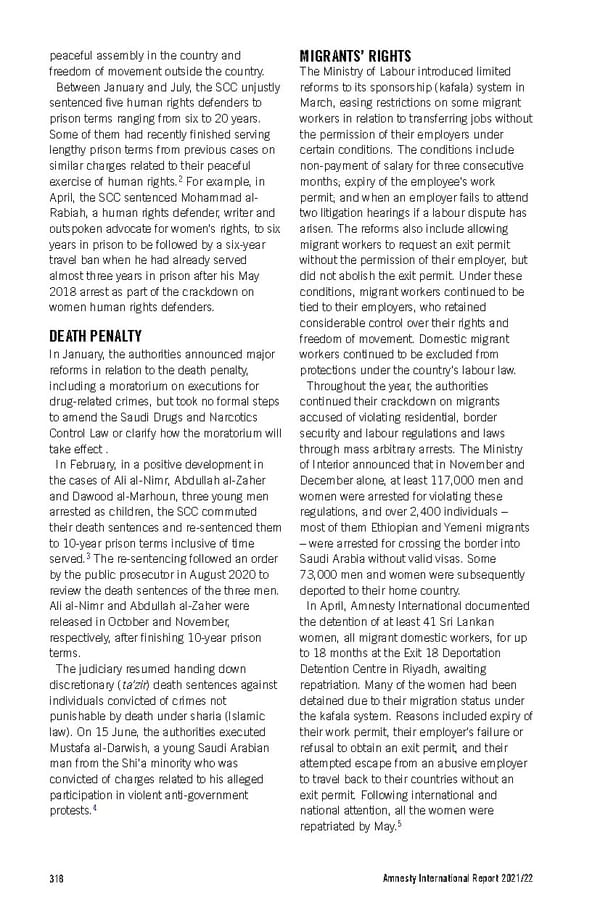peaceful assembly in the country and MIGRANTS’ RIGHTS freedom of movement outside the country. The Ministry of Labour introduced limited Between January and July, the SCC unjustly reforms to its sponsorship (kafala) system in sentenced five human rights defenders to March, easing restrictions on some migrant prison terms ranging from six to 20 years. workers in relation to transferring jobs without Some of them had recently finished serving the permission of their employers under lengthy prison terms from previous cases on certain conditions. The conditions include similar charges related to their peaceful non-payment of salary for three consecutive exercise of human rights.2 For example, in months; expiry of the employee’s work April, the SCC sentenced Mohammad al- permit; and when an employer fails to attend Rabiah, a human rights defender, writer and two litigation hearings if a labour dispute has outspoken advocate for women’s rights, to six arisen. The reforms also include allowing years in prison to be followed by a six-year migrant workers to request an exit permit travel ban when he had already served without the permission of their employer, but almost three years in prison after his May did not abolish the exit permit. Under these 2018 arrest as part of the crackdown on conditions, migrant workers continued to be women human rights defenders. tied to their employers, who retained DEATH PENALTY considerable control over their rights and freedom of movement. Domestic migrant In January, the authorities announced major workers continued to be excluded from reforms in relation to the death penalty, protections under the country’s labour law. including a moratorium on executions for Throughout the year, the authorities drug-related crimes, but took no formal steps continued their crackdown on migrants to amend the Saudi Drugs and Narcotics accused of violating residential, border Control Law or clarify how the moratorium will security and labour regulations and laws take effect . through mass arbitrary arrests. The Ministry In February, in a positive development in of Interior announced that in November and the cases of Ali al-Nimr, Abdullah al-Zaher December alone, at least 117,000 men and and Dawood al-Marhoun, three young men women were arrested for violating these arrested as children, the SCC commuted regulations, and over 2,400 individuals – their death sentences and re-sentenced them most of them Ethiopian and Yemeni migrants to 10-year prison terms inclusive of time – were arrested for crossing the border into served.3 The re-sentencing followed an order Saudi Arabia without valid visas. Some by the public prosecutor in August 2020 to 73,000 men and women were subsequently review the death sentences of the three men. deported to their home country. Ali al-Nimr and Abdullah al-Zaher were In April, Amnesty International documented released in October and November, the detention of at least 41 Sri Lankan respectively, after finishing 10-year prison women, all migrant domestic workers, for up terms. to 18 months at the Exit 18 Deportation The judiciary resumed handing down Detention Centre in Riyadh, awaiting discretionary (ta’zir) death sentences against repatriation. Many of the women had been individuals convicted of crimes not detained due to their migration status under punishable by death under sharia (Islamic the kafala system. Reasons included expiry of law). On 15 June, the authorities executed their work permit, their employer’s failure or Mustafa al-Darwish, a young Saudi Arabian refusal to obtain an exit permit, and their man from the Shi’a minority who was attempted escape from an abusive employer convicted of charges related to his alleged to travel back to their countries without an participation in violent anti-government exit permit. Following international and protests.4 national attention, all the women were 5 repatriated by May. Amnesty International Report 2021/22 318
 Amnesty International Report 2021/22 Page 317 Page 319
Amnesty International Report 2021/22 Page 317 Page 319